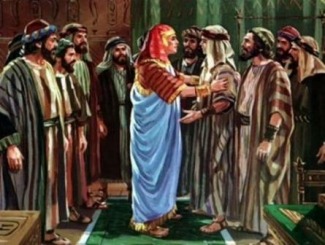
By Wikipedia
Pharaoh acknowledged that Joseph’s proposal to store grain during the abundant period was very wise. So before Joseph was even 30 years old, Pharaoh released him from prison and put him in charge over “all the land of Egypt” as Vizier. The Pharaoh took off his signet ring and put it on Joseph’s hand, then clothed him in fine linen and put a gold necklace around his neck. He was then renamed Zaphnath-Paaneah and was given Asenath, the daughter of Potipherah who was the priest of On, to be his wife. During those seven years of abundance, Joseph ensured that the storehouses were full and that all produce was measured until there was so much that it became immeasurable. In the final year of abundance, Asenath bore two children to Joseph: Manasseh and Ephraim. When the famine came, it was so severe that people from surrounding nations “from all over the earth” came to Egypt to buy bread as this nation was the only Kingdom prepared for the seven year drought. The narrative also indicates that they went straight to Joseph or were directed to him, even by Pharaoh himself, so as to buy from him. (Genesis 41:37-57)
The seven year famine became so severe that toward the later period, even Egypt was being strangled. Because the Egyptians had used up all of their money to buy grain in the previous years, there was no more money left. All they had was their livestock and even that dwindled down to nothing. As a last resort, all of the inhabitants of Egypt, less the Egyptian priestly class, sold all of their properties to Joseph for seed. These properties now became the property of the Pharaoh, or in other words, government property. Joseph also set a mandate that because they will be harvesting seed on government property, a fifth of the produce should go to the Pharaoh. Giving a fifth of the produce to the Pharaoh continued down to the days of Moses. (Genesis 47:20-31)
Related Viewing:
-
Why in the World are They Spraying
Solari
Genetic Roulette
Solari
Geoengineering Projects Around the World – Map
The Guardian

